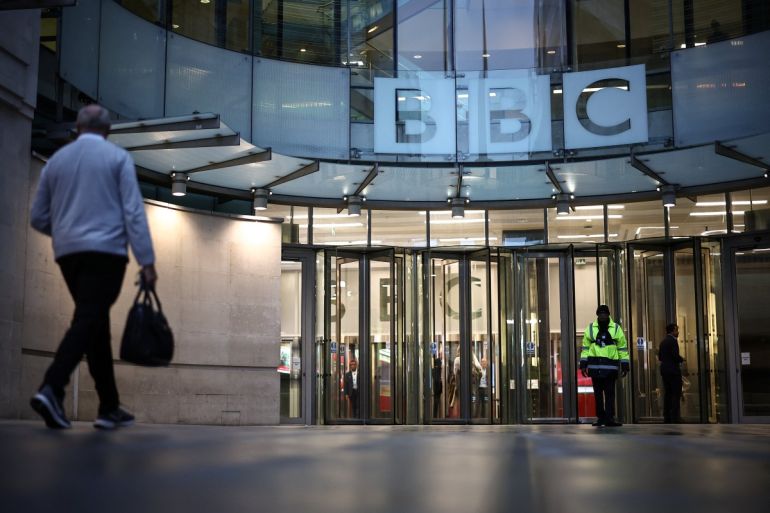‘We have to fight’: BBC’s outgoing boss rallies staff amid Trump’s threats
Tim Davie says the BBC’s ‘enemies’ will not define the narrative around the UK public broadcaster.

By John Power
Published On 12 Nov 202512 Nov 2025
Save
The BBC’s outgoing boss has said that the United Kingdom’s public broadcaster will not be defined by its “enemies” as it faces a public relations and leadership crisis and legal threats from US President Donald Trump.
In a call with staff on Tuesday, the BBC’s director-general, Tim Davie, said he was “fiercely proud” of the publicly-funded broadcaster, even as he acknowledged that it had made mistakes.
Recommended Stories
list of 4 itemsend of list
“We will thrive, and this narrative will not just be given by our enemies. It’s our narrative,” Davie said.
Davie said the BBC needed to defend its work in the face of mounting attacks on the media.
“I think we have to fight for our journalism,” Davie said.
“There are difficult times it goes through, but it just does good work,” he added.
“And that speaks – it speaks louder than any newspaper, any weaponisation. We are the very best of what I think we should be as a society.”
Davie’s comments come as the BBC grapples with accusations of bias following the leak of an internal memo that accused producers of making misleading edits to footage of Trump’s speech before the January 6, 2021, riot at the United States Capitol.
Trump has threatened to sue the BBC over the edited footage, aired in the Panorama documentary Trump: A Second Chance?, by Friday, unless the broadcaster provides a “full and fair” retraction and compensation.
BBC executives have acknowledged that the footage, which appeared to show Trump directly encouraging the attack on the US Capitol, was misleading, but have rejected claims of systemic bias.
Advertisement
Davie and the BBC’s head of news, Deborah Turness, resigned on Sunday, amid the fallout of the controversy, leaving the broadcaster leaderless as it faces a mid-term government review of its governance and regulatory arrangements.
The BBC, which gets most of its funding from about 24 million licence fee payers in the UK, has faced accusations of bias from across the ideological spectrum.
Conservative politicians and media have long accused the BBC of having a liberal bias, but the broadcaster has also come under fire from the left over its coverage of politically charged issues, such as Israel’s war in Gaza.
Despite its critics, the BBC has been repeatedly rated as the most trusted news outlet in the UK.
In a survey by the Reuters Institute for the Study of Journalism last year, 62 percent of respondents said they viewed the BBC as trustworthy, more than for any other outlet included in the poll.
Polling on the BBC’s alleged biases has shown public opinion split along party lines.
In a YouGov poll released on Tuesday, 31 percent of respondents said the broadcaster favoured left-wing views, while 19 percent said that it leaned right.
While 73 percent of Reform UK voters and 52 percent of Conservative Party voters perceived a left-wing bias, 32 percent of Labour Party voters identified a right-wing bias.
Half of the respondents said the BBC had no political bias, or that they did not know.

